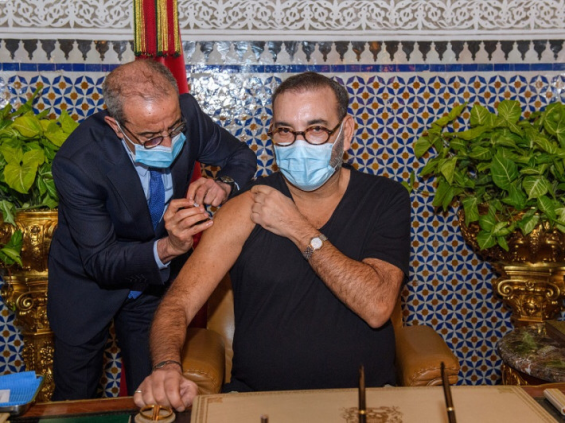Only three weeks after the King launched the vaccination campaign, Morocco has reached a satisfactory cruising speed compared to other major nations. It has already exceeded the rate of people vaccinated per 100 inhabitants in the majority of the countries of the European Union, despite starting a month behind them. It is also ahead of large countries such as Brazil, China or Russia.
This high vaccination rate for the first dose was made possible thanks to a good organization of the nursing staff and national logistics, with peaks of more than 200,000 people vaccinated per day (with a record registered at 318,552 vaccinations in one day). This vaccine performance is observed on the average over 7 days compared to other countries. Thus, over the last 7 rolling days, Morocco (with 0.53% of its population inoculated with vaccines) is ahead of the United States (0.48%) and even outperforms the countries of the European Union (<0.21%).

However, the satisfactorily good vaccination conditions in terms of organization, reception of the doses and pace of inoculation should not obscure the downsides. At the present vaccination rate, herd immunity will not be attainable by early May as promised by the Minister of Health, Khalid Aït Taleb. Indeed, at the current rate, we could expect reaching herd immunity by the fall season. Especially as it is necessary, meanwhile to maintain the pace of the second phase, i.e. the administration of the second dose, which began on Thursday.
Herd immunity by the end of 2021 ?
As the teams in charge gain experience in rolling out the vaccines and the priority population categories expand, the vaccination rate would obviously accelerate. It will all depend on Morocco's capacity to ensure the deliveries of AstraZeneca (22 million doses) and Sinopharm (40 million doses) vaccines. For the former, Morocco has succeeded in being one of the privileged few countries receiving the vaccine from the Serum Institute of India (6 million doses already received). As for Sinopharm, while the Kingdom has participated in the clinical trial and most of its vaccine supply must come from China, only 1 million doses have been received so far.

These deliveries, although still insufficient, remain encouraging when compared with the situation of countries similar in terms of size and wealth. In a strained global vaccine market, Morocco is doing well since it has even received more doses than France for example (about 4.5 million doses), while the latter’s population is twice as high as the former’s.
Despite an initial failure regarding the effective start of the vaccination campaign announced for December, and the unrealistic herd immunity promises of the Minister of Health, Morocco is doing well. The population, despite reluctance fuelled by some anti-vaccination individuals, adheres positively to the national effort to contain the Covid-19 pandemic. The example set by King Mohammed VI when he was the first to be vaccinated was part of this global effort. Hopefully, the emphasis on Sinopharm's jab for the royal vaccination will serve as a signal to Beijing to speed up the pace of delivery.





 chargement...
chargement...













